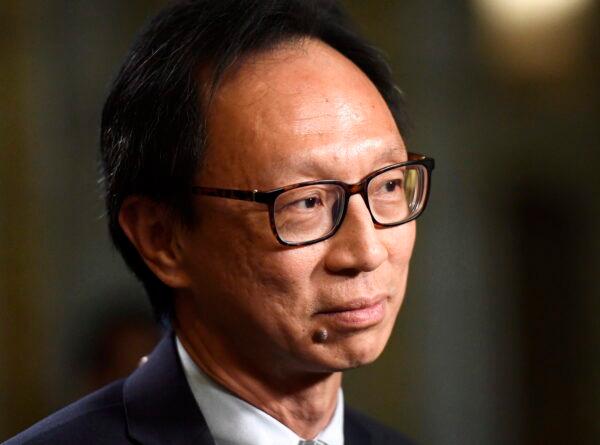Conservative Sen. Leo Housakos says he finds it unusual that a motion he introduced to recognize communist China’s mistreatment of Uyghurs and other Turkic Muslims as an act of genocide was voted down.
The motion was voted down 33-29 in the Senate on June 29, with 13 abstentions. It was supported by Conservative senators, while the majority of the Independent Senators Group, comprised mainly of senators appointed by Prime Minister Justin Trudeau and led by Sen. Yuen Pau Woo, and the Progressive Senate Group, comprised mainly of former Liberal senators appointed by Trudeau’s Liberal predecessors, voted against the motion.

A similar motion to recognize China’s treatment of Uyghurs as genocide, sponsored in House of Commons by Conservative MP Michael Chong, passed unanimously on Feb. 22, with Prime Minister Justin Trudeau and his cabinet abstaining from the vote.
“The motion was finally called to question after many months of procrastination and intentional delaying from Trudeau-appointed senators led by Sen. Peter Harder … and of course Sen. Woo, who has become the chief apologist for the Chinese Communist regime in the Senate of Canada,” Housakos said in an interview.
“There was also a lot of senators that didn’t participate in the vote at all, probably about another 20, which indicates to me there was a lot of pressure put on senators—particularly Trudeau-appointed senators, by this government—who wanted to vote for the motion to abstain or to conveniently not show up.”
Housakos said the mistreatment of Uyghur minorities in Xinjiang demonstrates that communist China’s “biggest abuse is towards their own people.”
He criticized the Liberal government, saying it “continues to kowtow and to always appease the brutal behaviour of the Chinese regime, regardless of if they’re illegally detaining Canadian citizens, if they’re trampling on democracy activists in Hong Kong, and ... the most brutal behaviour of all, which is conducting ethnic cleansing of Muslim minorities in China.”
During the Senate debate on June 28, Woo called on parliamentarians to vote against the motion, while cautioning against questioning the legitimacy of the Chinese government and its lack of democracy.
“The fact that China does not share our view of individual freedoms or, indeed, our interpretation of freedoms based on the Charter is not a basis on which to lecture the Chinese on how they should govern themselves,” he said.
“We also cannot deny that the Chinese state has its own claim to a kind of legitimacy, even if we don’t like it.”
Housakos counters that while Canada has had a “dark period” in its history, “we’re trying to work to come to terms with it, we’re trying to reach reconciliation.”
“[But] the Chinese regime today, as we speak, is conducting these atrocities,” he told The Epoch Times.
“Great democracies like Canada are only great because we recognize our atrocities. We recognize our blemishes in our history, we apologize for them, we come to terms with them, and we’re in a constant attempt for reconciliation with our indigenous people,” he said.
“But to use those atrocities of the past to justify atrocities that are currently being conducted today as we speak against minority Uyghurs, and to have a Canadian parliamentarian and a senator using that example, it’s outrageous.”
Woo said in his speech that including the “genocide label” in the current motion “does not add any actionable measure specific to the Uyghur situation in China; it is simply an exercise in labelling.”
In response to a request for comment on Housakos’s remarks, Woo referred to some parts of his speech, including where he said: “There is a worrying trend in this country where discussions about China and Canada-China relations are framed in Manichean terms, and where Canadians with connections to China are received with discomfort, suspicion, or outright hostility.”
“That is why it is not easy for me to make this speech, which is likely to generate a torrent of reflexive denunciations and crude labelling,” he said. “I reject that kind of reductive logic and the insidious insinuations that come with it.”
Housakos, however, says Woo’s speech was “very much verbatim talking points that have been used by Beijing to justify inhumane behaviour towards the Uyghur people. … To see a Canadian parliamentarian embrace those talking points that the Chinese regime is using is very disturbing.”
As for concerns around supposed “anti-Asian racism” in Canada, Housakos says Beijing is using the tactic of “manipulating Canadians of Chinese descent … that somehow anybody that condemns the tyrannical regime of Beijing is condemning the Chinese people.”
“That is insulting to Canadians of Chinese origin. … The vast majority who came to this country, they came to avoid tyranny or economic depression, they came here for freedom and opportunity,” he said.
The Epoch Times reached out to Sen. Harder for comment, but didn’t receive a response.





